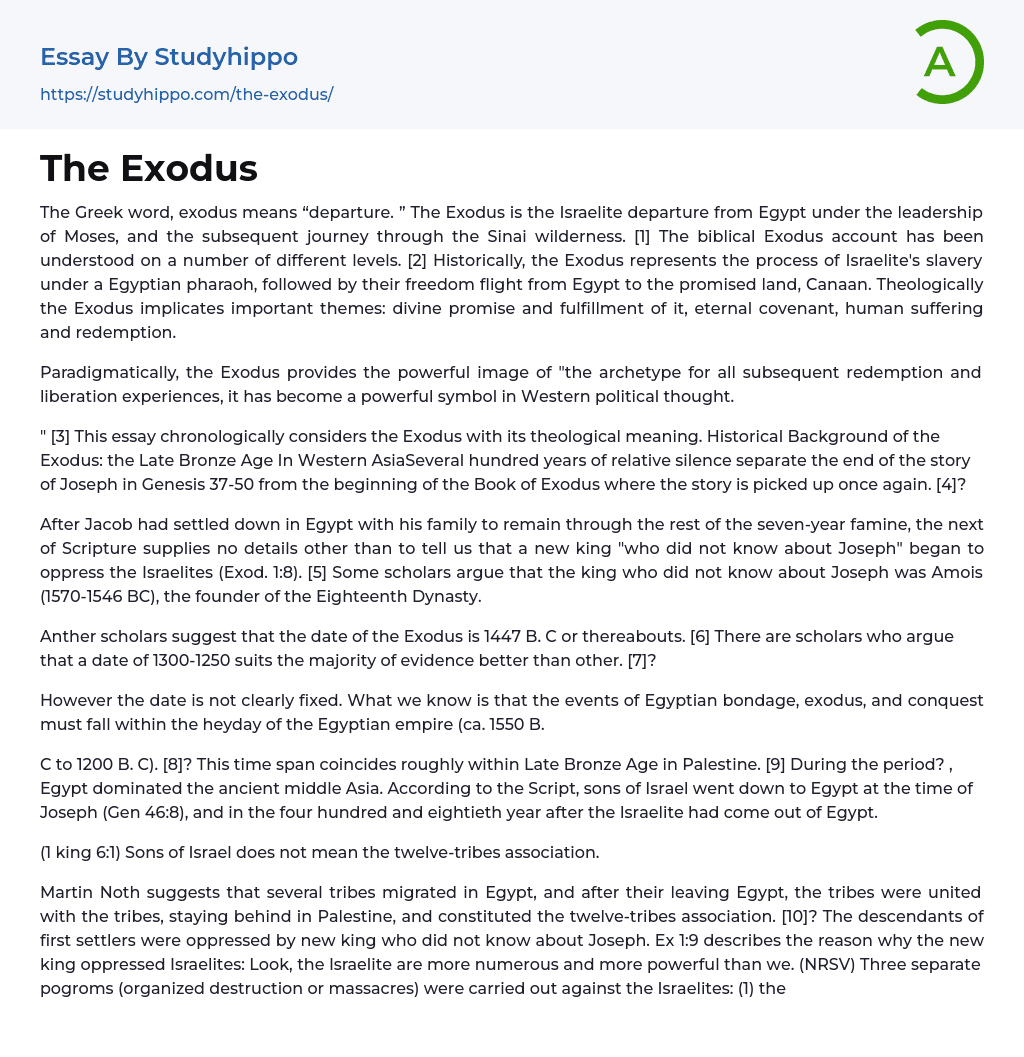The term "exodus" originates from the Greek word meaning "departure," and is a significant event in Israelite history. Moses led the Israelites on their departure from Egypt, followed by their journey through the Sinai wilderness. The biblical account of the Exodus has been subject to various interpretations, including historical significance as it highlights enslavement under an Egyptian pharaoh, escape from Egypt and journey to Canaan. Theologically, it touches upon key themes such as divine promise and fulfillment, eternal covenant, human suffering and redemption. Paradigmatically, it serves as a symbol of liberation that has influenced Western political thinking. This essay presents a chronological account of the Exodus events with theological implications. Following Joseph's story in Genesis 37-50, several hundred years passed until a new king rose in Egypt who did not know Joseph and began op
...pressing Israelites (Exod.1:8). Scholars have proposed different theories regarding this king's identity or dates for the Exodus itself.During the height of the Egyptian empire (ca.1550 B.C to 1200 B.C) in Palestine, Egypt dominated ancient Middle Asia, and it is evident that the events of Egyptian bondage, exodus, and conquest occurred during this time. The descendants of the initial settlers faced oppression from a new king who did not know Joseph, as stated in Exodus 1:9. According to Martin Noth's theory, several tribes migrated to Egypt and then combined with those who remained in Palestine to form the twelve-tribes association mentioned in Genesis 46:8 and 1 Kings 6:1, although "sons of Israel" does not necessarily refer only to them. Israelites underwent three pogroms - building two store cities as slaves (Exod.:11-12), midwives being directed to kill all newborn male babies (Exod.1:15-22), and
gathering their straw while maintaining workload (Exod.5:6-23). Moses' parents were Amram and Jochebed, a Levitical Couple according to Exod.2:2; when Moses was born, Pharaoh ordered all newly born male babies killed (Exod.1:15). In Exod.2:1-10., we can read how Moses' early life was saved thanks to his mother's actions despite Pharaoh's order for infanticideReceiving an outstanding education in the palace of Egypt, Moses may have been influenced by it during his mission. Exod.2:11-21 records events from his middle years. His advanced understanding of terrain, people, and situations on his journey could be attributed to Egyptian texts or training he was exposed to during education, such as geography from Papyrus Anastaisi I. Scholars suggest three possible routes between Egypt and Palestine with the third being chosen by Israelites leading them along the Red Sea coastline from Pi-hahiroth to Median land. The story of Exodus highlights divine promise, human suffering, redemption, and God's compassion themes central to the covenant reflecting sincerity attributes of God. Australia faces an economic recession due to American depression causing a surge in unemployment rates and business collapses.
The current economic situation is causing fear and anxiety among the poor and lower middle class. Similarly, like the ancient Israelites who were oppressed by Egyptians, Australians are currently experiencing mental oppression due to anxiety. This presents an opportunity for Australians to seek compassion from Yahweh during these difficult times. However, certain conditions must be met, including having faith in Jesus and the new agreement to become "new Israelites." Australian churches can play a crucial role in this endeavor by helping others become "new Israelites" and acting as Moses to lead them towards a new Canaan
where they can find liberation from anxiety and fear through their belief in Yahweh, an authentic and trustworthy God.




